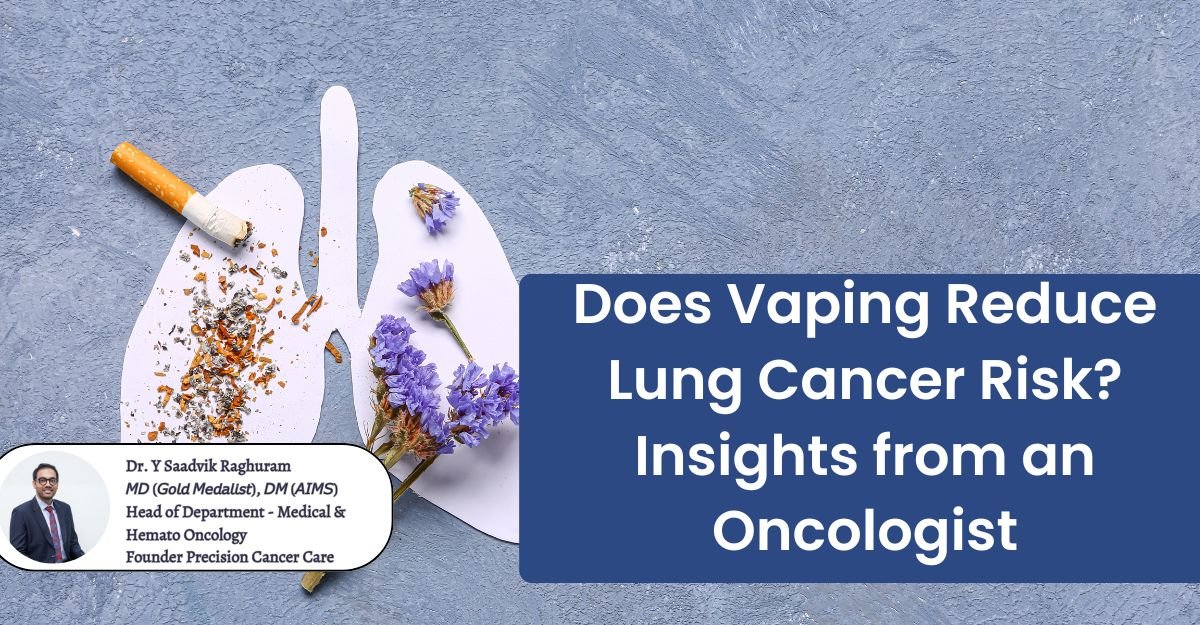
Lung cancer remains one of the leading causes of cancer-related deaths worldwide, with smoking being the primary culprit. As the dangers of traditional cigarettes have become widely known, many people have turned to vaping as a potential “safer” alternative. But does vaping actually reduce the risk of lung cancer compared to smoking? Let’s explore the facts from an oncologist’s perspective.
Understanding Vaping: What Is It?
Vaping involves inhaling aerosol (commonly referred to as vapor) produced by an electronic cigarette or similar device. The device heats a liquid—usually containing nicotine, flavorings, and other chemicals—into an aerosol that the user inhales.
Although vaping eliminates some of the harmful chemicals produced by burning tobacco, like tar and carbon monoxide, it is far from risk-free.
Vaping vs. Smoking: A Comparative Risk for Lung Cancer
Traditional cigarettes contain more than 70 known carcinogens (cancer-causing substances), making them highly dangerous to lung health. Cigarette smoke causes long-term damage to the lungs, leading to the development of lung cancer over time.
Vaping products, on the other hand, often contain fewer toxic chemicals than cigarettes, which has led to claims that they are safer. However, while vaping may reduce exposure to some of the most harmful substances in cigarettes, it does not eliminate cancer risk.
Here’s why:
- Presence of Harmful Chemicals: E-cigarettes contain chemicals like formaldehyde, acetaldehyde, and acrolein, all of which can cause cellular damage and inflammation in the lungs. Prolonged exposure to these chemicals can still contribute to lung cancer development.
- Nicotine and Lung Cancer Risk: Nicotine, a key component in both traditional cigarettes and vaping products, is not directly carcinogenic, but it promotes tumor growth by encouraging the growth of blood vessels that feed cancer cells. This means that while vaping might reduce exposure to certain toxins, the nicotine itself can still contribute to cancer risk.
- Limited Long-Term Data: Vaping is a relatively recent trend compared to decades of research on cigarette smoking. This means we do not yet have long-term data on the true cancer risks associated with vaping. However, early studies indicate that vaping is not without health consequences, especially in terms of lung damage.
Can Vaping Help Smokers Reduce Lung Cancer Risk?
There is some evidence to suggest that vaping can help heavy smokers reduce their cigarette consumption or even quit smoking altogether. For smokers unable to quit through other means, switching to vaping may be a less harmful alternative to traditional cigarettes. But this should not be seen as a long-term solution.
It’s important to note that while vaping may be less harmful than smoking, it is not harmless. The best way to reduce the risk of lung cancer is to eliminate the use of all tobacco and nicotine products.
What About Non-Smokers Who Vape?
Vaping has become popular among younger populations, including those who have never smoked cigarettes. This is particularly concerning because non-smokers who start vaping are exposing themselves to harmful chemicals unnecessarily, increasing their risk of lung damage and potentially lung cancer over time.
For non-smokers, vaping provides no health benefit and should be avoided altogether.
Final Thoughts: Reducing Lung Cancer Risk
Vaping may be less harmful than smoking cigarettes, but it is not a safe alternative. The best way to reduce the risk of lung cancer is by quitting smoking or vaping entirely and avoiding exposure to harmful chemicals in any form. If you’re a smoker looking to quit, speak with your healthcare provider about evidence-based cessation methods, such as nicotine replacement therapy, prescription medications, and counseling.
In conclusion, while vaping might reduce some risks compared to traditional smoking, it does not eliminate the potential for lung cancer. Both smoking and vaping pose health risks, and the only truly safe option is to quit both entirely.
Contact us for more
Why Are So Many Young People Getting Cancer Today? Across the world, …
January is Cervical Cancer Awareness Month in India, and this article explains …
Cancer-Related Fatigue (CRF) is one of the most common—and most underestimated—symptoms experienced …
Every year, Aplastic Anemia Awareness Month shines a spotlight on a rare …
By Dr. Saadvik Raghuram Y Senior Consultant & Chief of Medical Oncology, …
In today’s fast-paced world, stress has almost become a way of life. …

